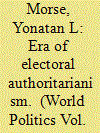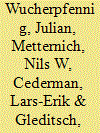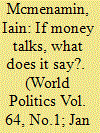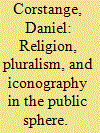|
|
|
Sort Order |
|
|
|
Items / Page
|
|
|
|
|
|
|
| Srl | Item |
| 1 |
ID:
112513


|
|
|
|
|
| Publication |
2012.
|
| Summary/Abstract |
In recent years scholarly attention has shifted from the study of democratization to the phenomenon of electoral authoritarianism. In these regimes, regular elections are held for national legislatures and chief executives, yet they fail to live up to democratic standards of freedom and fairness. A range of new research has investigated these regimes and especially the capacity of elections to either dislodge or reinvigorate authoritarian incumbents. This article reviews some of the current work on electoral authoritarianism and attempts to find ways to achieve synthesis and better theoretical development. It notes the need for greater conceptual consensus, attention to context, and better evaluation of what electoral competiveness means under authoritarian conditions. It argues that the next stage for research should be smaller and contextual comparison that can allow for greater attention to concepts, while allowing for strong midrange theory.
|
|
|
|
|
|
|
|
|
|
|
|
|
|
|
|
| 2 |
ID:
112511


|
|
|
|
|
| Publication |
2012.
|
| Summary/Abstract |
Previous research has focused primarily on how ethnicity may trigger civil war, and its effect on conflict duration remains disputed. Rather than treating conflict as a direct consequence of ethnic cleavages, the authors argue that ethnicity per se does not affect civil war duration. Instead, its effect depends on its relationship to political institutions. They employ a dyadic approach that emphasizes the political context in which both government leaders and nonstate challengers can capitalize on the ascriptive nature of ethnicity. They show that although states can initially benefit from politicizing ethnic relations, once violent conflict breaks out, such policies may backfire on the government and make it difficult for incumbent governments to accept settlements that could terminate conflicts. Past policies of ethnic exclusion also benefit rebel organizations fighting the government, since the resulting grievances increase collective group solidarity and render individual fighters more cost tolerant. Using a new data set that codes the nexus between rebel organizations and ethnic groups, as well as information on ethnopolitical exclusion, the authors find considerable support for their propositions.
|
|
|
|
|
|
|
|
|
|
|
|
|
|
|
|
| 3 |
ID:
112509


|
|
|
|
|
| Publication |
2012.
|
| Summary/Abstract |
Do business contributions to political parties convey different messages in different countries, and, if so, why? This article presents a pioneering cross-national study of firm behavior in political finance. It argues that motivations for contributions to parties are either ideological or pragmatic. The author infers motivation by quantitatively relating the payments of 960 firms to various political parties in Australia, Canada, and Germany over periods of between seven and seventeen years. In coordinated market economy Germany, a small number of firms made ideological payments; in liberal market economy Australia and Canada, large numbers of firms made pragmatic payments. Australia's left-right party system creates an awareness of policy risk, which motivated ideological payments, but in Canada's unusually nonideological party system no ideological bias in business financing of politics was found. The statistical analysis is supplemented by a qualitative investigation of discrete and reciprocal exchanges between businesses and political parties.
|
|
|
|
|
|
|
|
|
|
|
|
|
|
|
|
| 4 |
ID:
112510


|
|
|
|
|
| Publication |
2012.
|
| Summary/Abstract |
Terrorist groups repeatedly include operatives of varying commitment and often rely on a common set of security-reducing bureaucratic tools to manage these individuals. This is puzzling in that covert organizations are commonly thought to screen their operatives very carefully and pay a particularly heavy price for record keeping. The authors use terrorist memoirs and the internal correspondence of one particularly prominent group to highlight the organizational challenges terrorist groups face and use a game-theoretic model of moral hazard in a finitely sized organization to explain why record keeping and bureaucracy emerge in these groups. The model provides two novel results. First, in small heterogeneous organizations longer institutional memory can enhance organizational efficiency. Second, such organizations will use worse agents in equilibrium under certain conditions. The core logic is that in small organizations the punishment strategies that allow leaders to extract greater effort are credible only when operatives can identify and react to deviations from the leaders' equilibrium strategy. This dynamic creates incentives for record keeping and means that small organizations will periodically use problematic agents in equilibrium as part of a strategy that optimally motivates their best operatives.
|
|
|
|
|
|
|
|
|
|
|
|
|
|
|
|
| 5 |
ID:
112512


|
|
|
|
|
| Publication |
2012.
|
| Summary/Abstract |
This article examines mass public discourse on religion and pluralism in diverse societies. It argues that religion enters the public sphere by defining countervailing narratives about sectarianism, which is exclusive and divisive, and ecumenicism, which is inclusive and unifying. Most empirical studies focus on elites as the producers of discourse and ignore the regular people who comprise the "real" public. In contrast to prior work, this article systematically examines mass public discourse, with Lebanon, a religiously diverse developing world society, as its research venue. It uses a novel combination of original survey data and publicly displayed religious and political iconography to study the exchange of ideas about religion and pluralism among the mass public. It shows that sectarian discourse articulates ethnocentric and antiplural statements, whereas ecumenicism, by contrast, mitigates ethnocentrism and valorizes pluralism.
|
|
|
|
|
|
|
|
|
|
|
|
|
|
|
|
|
|
|
|
|